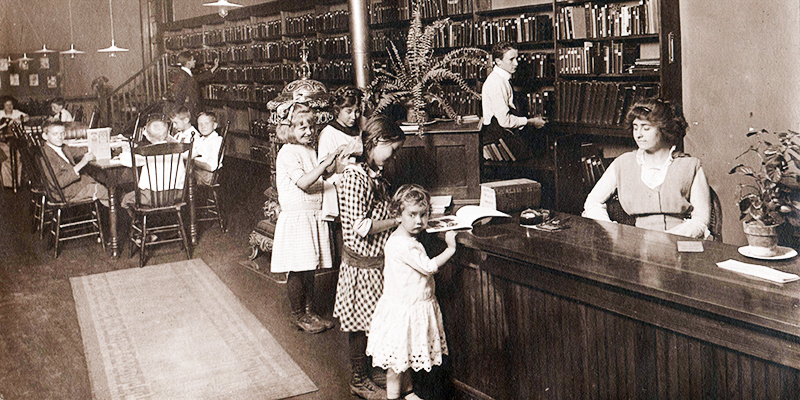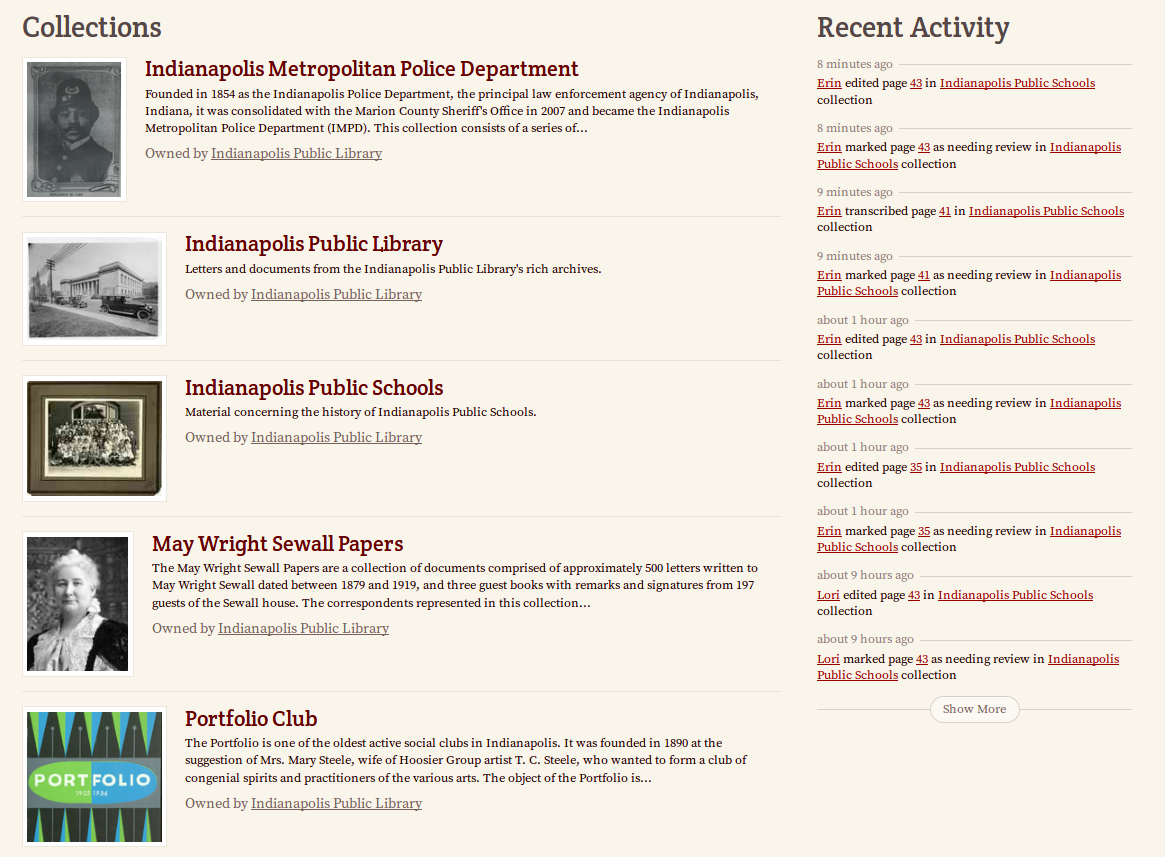Victoria Duncan is Digital Projects Coordinator at the Indianapolis Public Library. She kindly agreed to be interviewed by Sara Brumfield about the library's use of FromThePage.
First, tell us about your documents.
Currently we have 6 collections up on FromThePage: Indianapolis Metropolitan Police Department, Indianapolis Public Schools, Indianapolis Public Library, May Wright Sewall, and the Portfolio Club, all of which originate from the library’s digital collections at digitalindy.org. Comprising these collections is a diverse range of document types. The May Wright Sewall collection, for example, consists of letters from figures important to political and social movements in the 19th to the early 20th century. On the other end of the spectrum, we have the Indianapolis Public Schools collection that includes bound volumes with pages in the many hundreds. These volumes can be registers of Indianapolis school children, teacher salaries and purchasing records, and other administrative data. The IMPD collection is in transition as we finish up with some early 20th century police biographies and move on to booking records captured on the backs of mug shots printed on card stock.
What are your goals for the project?
Our ultimate goal for transcription is to provide comprehensive full-text searchabilty of our digital collections. The IPS material in particularly is unwieldy and almost unusable without the ability to search the documents. Transcribing the IPS registers of children, for example, will make a whole host of genealogical information accessible where previously it was nearly impossible to find a specific name or other information in the records. It is also our goal to increase the visibility of the collections to Indianapolis residents and beyond and our relationship with volunteers also helps us continue to reach new audiences. Most of our volunteers were unfamiliar with the library’s digital collections before learning about the opportunity to volunteer with us, so there is value beyond just the transcripts they produce.
How are you recruiting or finding volunteers? Are our volunteers local (to a library or Indianapolis) or remote?
So far we have recruited volunteers using only the library’s volunteer page and the personal promotion of the library volunteer coordinators who will refer volunteer groups from organizations looking for group volunteer events. In those cases we will host groups in the computer lab in fashion similar to a transcribe-a-thon. Aside from these groups and traffic garnered from the FromThePage site, which has been valuable to us, our volunteers are all Indianapolis natives working remotely. Being able to work from home on their own time has helped us attract volunteers who also have full-time jobs and want to work outside library hours, are busy students who have difficulty committing to a steady schedule, and people with transportation or other mobility issues.
Can you share your experience using FromThePage?
Because we are a very small department, we needed a service that was straightforward and easy to use. We had previously been using Google Docs, which was inconvenient for our volunteers because it required them to toggle back and forth between two browser windows, one displaying the document to be transcribed and the other the transcription. Only the most devoted volunteers were willing to put up with that method, but we are now able to recruit volunteers much more easily.
I like that FromThePage works for libraries at different levels. Institutions like Stanford who are integrating IIIF are impressive, but it is beyond the scope of our project. I love that the site works for a public library as well as an academic and we benefit from working alongside different institutions on a digital platform, in part because of the shared volunteer traffic. In addition, the site’s ease of use allows us to work with volunteers who have vastly different backgrounds and abilities and to keep our instructions simple.
Do you have any advice for other public libraries thinking about crowd-sourcing projects?
I think for public libraries in particular, it’s important to cater to a wide range of backgrounds and skill-sets when it comes to recruiting volunteers. The last thing we want is to turn someone away, so as a public institution we have to be especially creative and find material that would be straightforward enough for a class of high school students looking for service hours, while also selecting material engaging enough to keep a graduate student coming back for more. Balancing this with ensuring that the transcription we get is of good quality requires some extra care, but it is well worth it if we can help expand the library’s volunteer base while also promoting the collections.
Beyond that, the best advice for any institution thinking about a crowd-sourcing project is always to reach out to those who have already done it. This is especially important when it comes to finding effective ways to recruit and keep volunteers. Becoming familiar with some tried and true strategies for implementing crowd-sourcing projects will help you feel more confident and make you better able to convince others that the project is worth dedicating money and staff time to implementing. It will also enable you to develop some realistic goals that can help you measure the success of the project.
Anything else you’d like to tell us?
In the last year we’ve been able to introduce dozens of people to transcription who previously had no experience with it whatsoever. Seeing their joy at puzzling out a difficult word or finding something funny in an old letter has been a real blast!
Are you an archive or library that would like to start a transcription project? Start a free trial today.



